Abstract
High dose metoclopramide is an effective anti-emetic for use with cisplatin containing chemotherapy regimens but can cause extrapyramidal reactions. Lorazepam and dexamethasone are increasingly being used to alleviate chemotherapy induced emesis. This trial has assessed the contribution of high dose metoclopramide to anti-emetic control when given with dexamethasone and lorazepam. Eight-one patients receiving chemotherapy, mainly for gynaecological malignancy, entered a randomised double blind cross-over trial comparing dexamethasone and lorazepam with or without a 24 h metoclopramide infusion. This was followed by oral dexamethasone with or without oral metoclopramide for three further days depending on the initial randomisation. Sixty-one patients were fully evaluable. Fifty-five received cisplatin containing regimens and six non-cisplatin regimens. There was a significant reduction in the number of episodes of vomiting during the first 24 h in patients receiving the metoclopramide combination (P = 0.0001). On first exposure to chemotherapy 45% of patients receiving dexamethasone, lorazepam and high dose metoclopramide had no vomiting while 67% had two episodes or less ('major control'). This compared to 11% total control and 25% major control in those receiving dexamethasone, lorazepam and placebo. The control of nausea in the first 24 h was also improved (P = 0.0001). There was no difference in the degree of nausea or vomiting during the following three weeks between those receiving oral dexamethasone alone and those receiving dexamethasone and metoclopramide. Both groups showed a significant increase in nausea in the three weeks following the second course of treatment when compared to the first (P = 0.0007). Extrapyramidal reactions were recorded in 11.5% of patients receiving metoclopramide. More patients stated a preference for the metoclopramide combination although this was not statistically significant (chi 2(1) = 0.29, P = 0.59). In conclusion the combination of dexamethasone and lorazepam can give major control of emesis in 25% of patients receiving very emetogenic chemotherapy. The addition of metoclopramide increases this to 67% on first exposure to chemotherapy, but at the expense of extrapyramidal reactions in 11.5%.
Full text
PDF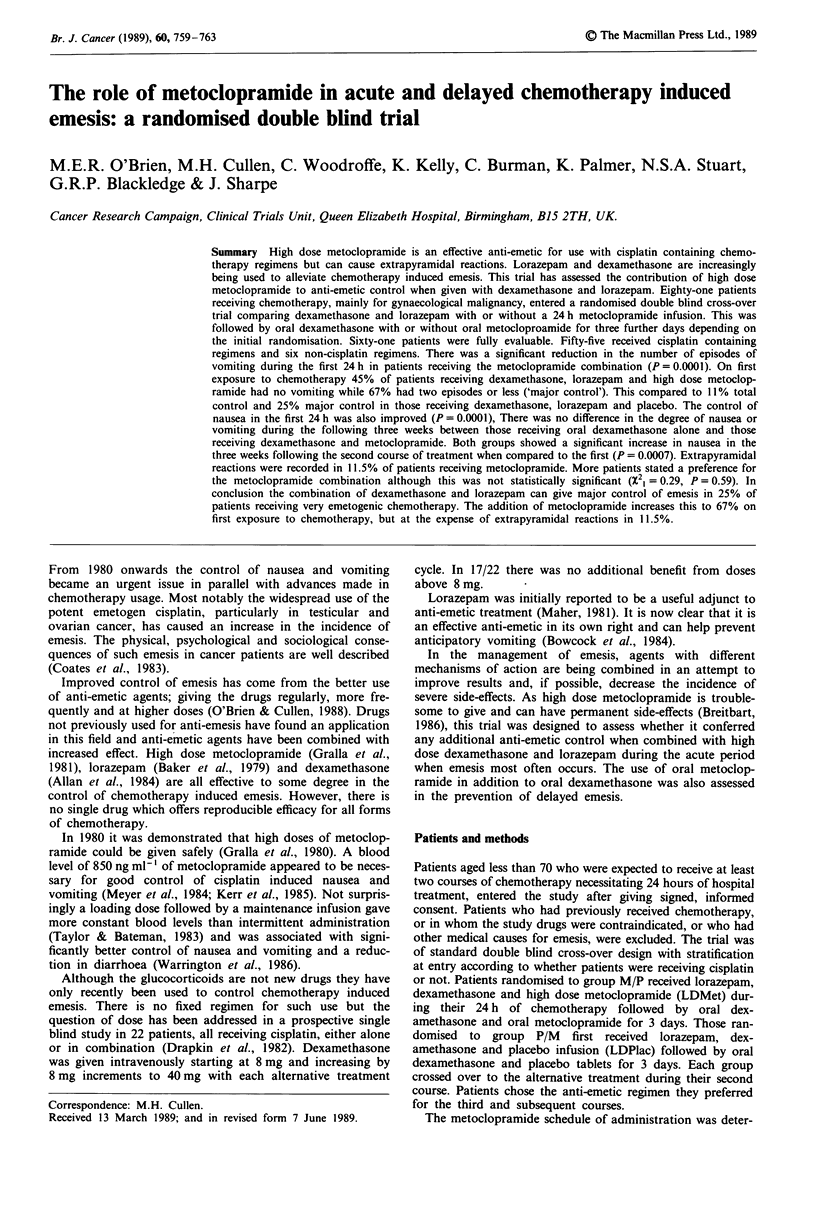
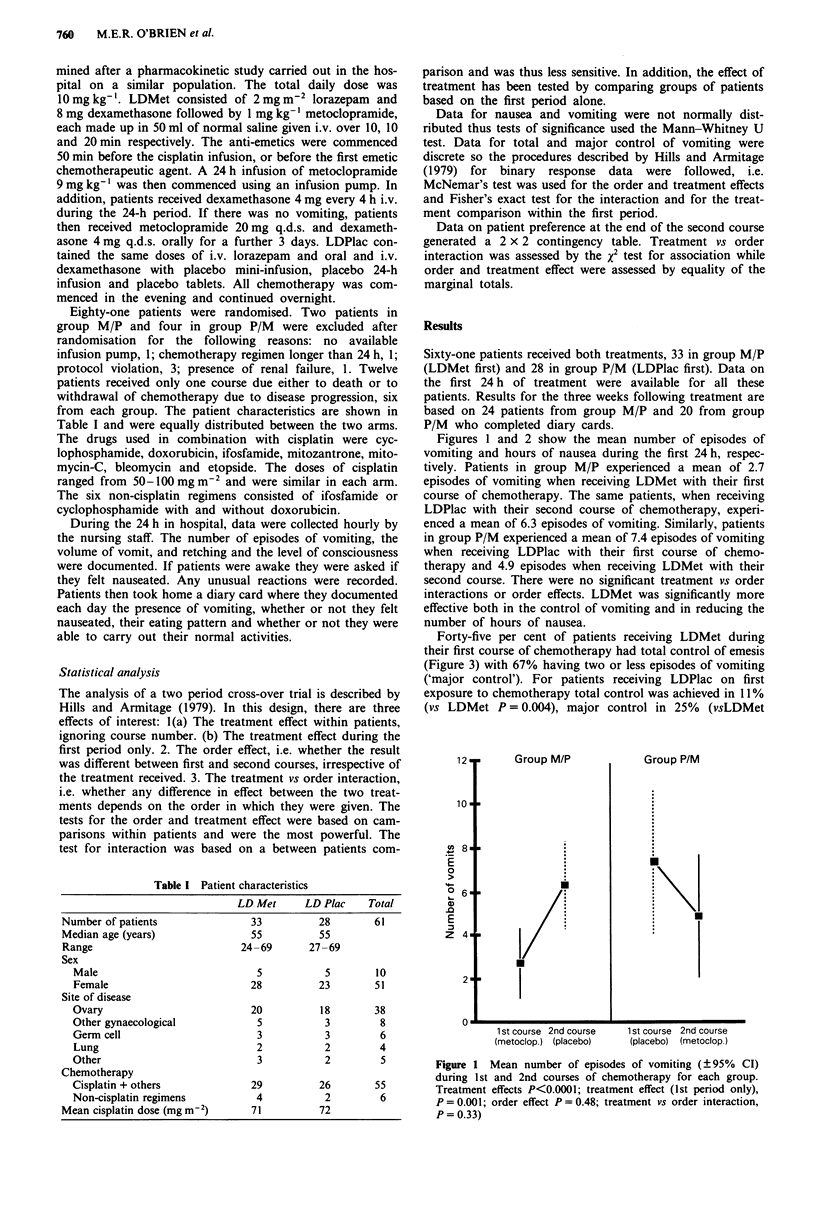
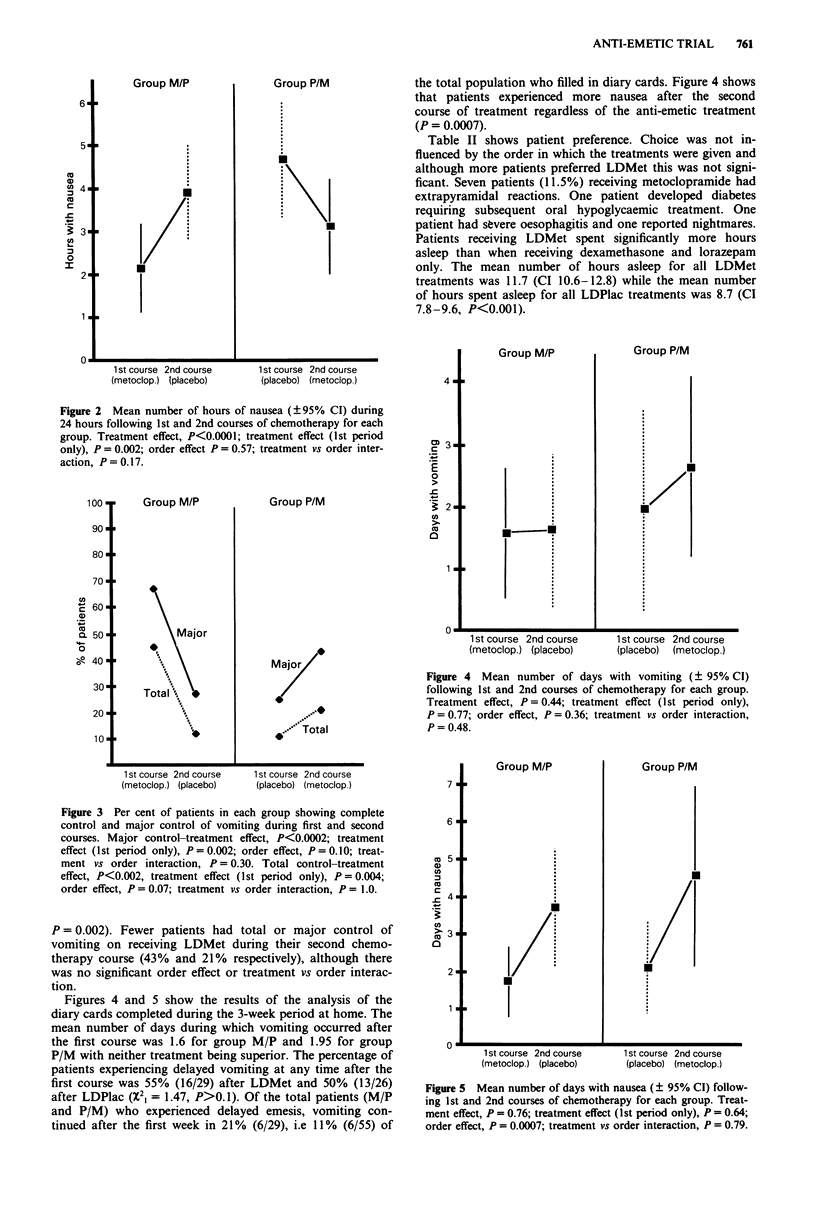
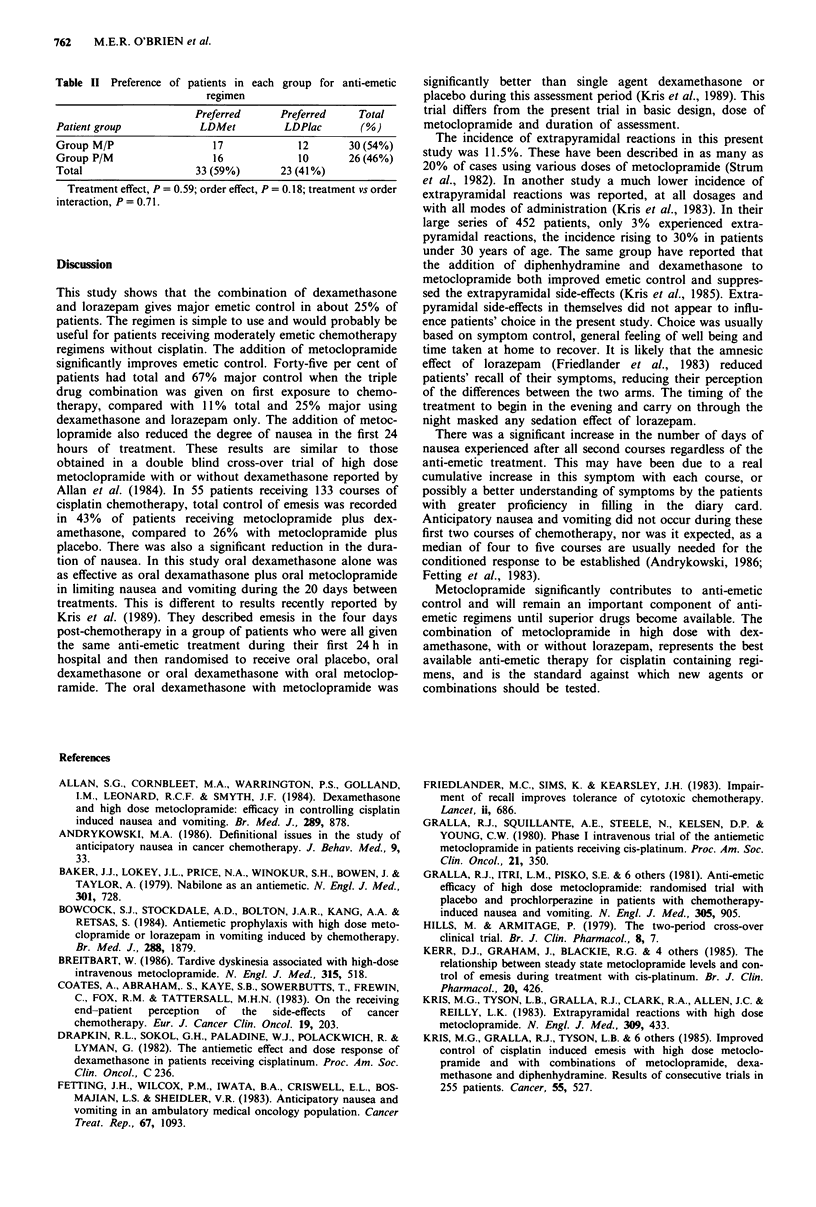
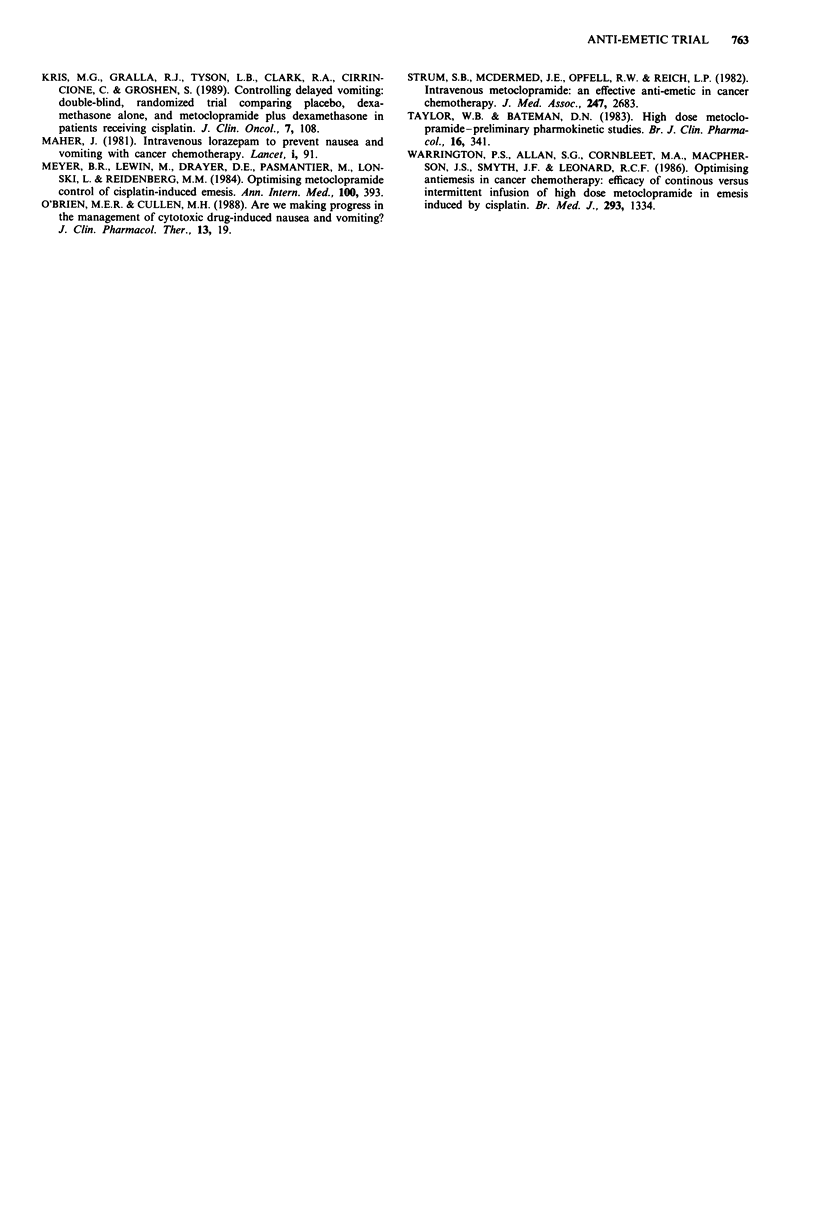
Selected References
These references are in PubMed. This may not be the complete list of references from this article.
- Allan S. G., Cornbleet M. A., Warrington P. S., Golland I. M., Leonard R. C., Smyth J. N. Dexamethasone and high dose metoclopramide: efficacy in controlling cisplatin induced nausea and vomiting. Br Med J (Clin Res Ed) 1984 Oct 6;289(6449):878–879. doi: 10.1136/bmj.289.6449.878-a. [DOI] [PMC free article] [PubMed] [Google Scholar]
- Andrykowski M. A. Definitional issues in the study of anticipatory nausea in cancer chemotherapy. J Behav Med. 1986 Feb;9(1):33–41. doi: 10.1007/BF00844642. [DOI] [PubMed] [Google Scholar]
- Baker J. J., Lokey J. L., Price N. A., Winokur S. H., Bowen J., Taylor A. Nabilone as an antiemetic. N Engl J Med. 1979 Sep 27;301(13):728–728. doi: 10.1056/NEJM197909273011318. [DOI] [PubMed] [Google Scholar]
- Bowcock S. J., Stockdale A. D., Bolton J. A., Kang A. A., Retsas S. Antiemetic prophylaxis with high dose metoclopramide or lorazepam in vomiting induced by chemotherapy. Br Med J (Clin Res Ed) 1984 Jun 23;288(6434):1879–1879. doi: 10.1136/bmj.288.6434.1879. [DOI] [PMC free article] [PubMed] [Google Scholar]
- Breitbart W. Tardive dyskinesia associated with high-dose intravenous metoclopramide. N Engl J Med. 1986 Aug 21;315(8):518–519. doi: 10.1056/NEJM198608213150816. [DOI] [PubMed] [Google Scholar]
- Coates A., Abraham S., Kaye S. B., Sowerbutts T., Frewin C., Fox R. M., Tattersall M. H. On the receiving end--patient perception of the side-effects of cancer chemotherapy. Eur J Cancer Clin Oncol. 1983 Feb;19(2):203–208. doi: 10.1016/0277-5379(83)90418-2. [DOI] [PubMed] [Google Scholar]
- Fetting J. H., Wilcox P. M., Iwata B. A., Criswell E. L., Bosmajian L. S., Sheidler V. R. Anticipatory nausea and vomiting in an ambulatory medical oncology population. Cancer Treat Rep. 1983 Dec;67(12):1093–1098. [PubMed] [Google Scholar]
- Friedlander M. L., Sims K., Kearsley J. H. Impairment of recall improves tolerance of cytotoxic chemotherapy. Lancet. 1983 Sep 17;2(8351):686–686. doi: 10.1016/s0140-6736(83)92568-0. [DOI] [PubMed] [Google Scholar]
- Gralla R. J., Itri L. M., Pisko S. E., Squillante A. E., Kelsen D. P., Braun D. W., Jr, Bordin L. A., Braun T. J., Young C. W. Antiemetic efficacy of high-dose metoclopramide: randomized trials with placebo and prochlorperazine in patients with chemotherapy-induced nausea and vomiting. N Engl J Med. 1981 Oct 15;305(16):905–909. doi: 10.1056/NEJM198110153051601. [DOI] [PubMed] [Google Scholar]
- Hills M., Armitage P. The two-period cross-over clinical trial. Br J Clin Pharmacol. 1979 Jul;8(1):7–20. doi: 10.1111/j.1365-2125.1979.tb05903.x. [DOI] [PMC free article] [PubMed] [Google Scholar]
- Kerr D. J., Graham J., Blackie R. G., McGovern E., Kelman A. W., Cunningham D., Kaye S. B. The relationship between steady state metoclopramide levels and control of emesis during treatment with cis-platinum. Br J Clin Pharmacol. 1985 Oct;20(4):426–427. doi: 10.1111/j.1365-2125.1985.tb05091.x. [DOI] [PMC free article] [PubMed] [Google Scholar]
- Kris M. G., Gralla R. J., Tyson L. B., Clark R. A., Cirrincione C., Groshen S. Controlling delayed vomiting: double-blind, randomized trial comparing placebo, dexamethasone alone, and metoclopramide plus dexamethasone in patients receiving cisplatin. J Clin Oncol. 1989 Jan;7(1):108–114. doi: 10.1200/JCO.1989.7.1.108. [DOI] [PubMed] [Google Scholar]
- Kris M. G., Gralla R. J., Tyson L. B., Clark R. A., Kelsen D. P., Reilly L. K., Groshen S., Bosl G. J., Kalman L. A. Improved control of cisplatin-induced emesis with high-dose metoclopramide and with combinations of metoclopramide, dexamethasone, and diphenhydramine. Results of consecutive trials in 255 patients. Cancer. 1985 Feb 1;55(3):527–534. doi: 10.1002/1097-0142(19850201)55:3<527::aid-cncr2820550310>3.0.co;2-2. [DOI] [PubMed] [Google Scholar]
- Kris M. G., Tyson L. B., Gralla R. J., Clark R. A., Allen J. C., Reilly L. K. Extrapyramidal reactions with high-dose metoclopramide. N Engl J Med. 1983 Aug 18;309(7):433–434. doi: 10.1056/nejm198308183090718. [DOI] [PubMed] [Google Scholar]
- Maher J. Intravenous lorazepam to prevent nausea and vomiting associated with cancer chemotherapy. Lancet. 1981 Jan 10;1(8211):91–92. doi: 10.1016/s0140-6736(81)90019-2. [DOI] [PubMed] [Google Scholar]
- Meyer B. R., Lewin M., Drayer D. E., Pasmantier M., Lonski L., Reidenberg M. M. Optimizing metoclopramide control of cisplatin-induced emesis. Ann Intern Med. 1984 Mar;100(3):393–395. doi: 10.7326/0003-4819-100-3-393. [DOI] [PubMed] [Google Scholar]
- O'Brien M. E., Cullen M. H. Therapeutic progress--review XXVIII. Are we making progress in the management of cytotoxic drug-induced nausea and vomiting? J Clin Pharm Ther. 1988 Feb;13(1):19–31. doi: 10.1111/j.1365-2710.1988.tb00503.x. [DOI] [PubMed] [Google Scholar]
- Strum S. B., McDermed J. E., Opfell R. W., Riech L. P. Intravenous metoclopramide. An effective antiemetic in cancer chemotherapy. JAMA. 1982 May 21;247(19):2683–2686. doi: 10.1001/jama.247.19.2683. [DOI] [PubMed] [Google Scholar]
- Taylor W. D., Bateman D. N. High dose metoclopramide-preliminary pharmacokinetic studies. Br J Clin Pharmacol. 1983 Sep;16(3):341–342. doi: 10.1111/j.1365-2125.1983.tb02173.x. [DOI] [PMC free article] [PubMed] [Google Scholar]
- Warrington P. S., Allan S. G., Cornbleet M. A., MacPherson J. S., Smyth J. F., Leonard R. C. Optimising antiemesis in cancer chemotherapy: efficacy of continuous versus intermittent infusion of high dose metoclopramide in emesis induced by cisplatin. Br Med J (Clin Res Ed) 1986 Nov 22;293(6558):1334–1337. doi: 10.1136/bmj.293.6558.1334. [DOI] [PMC free article] [PubMed] [Google Scholar]


